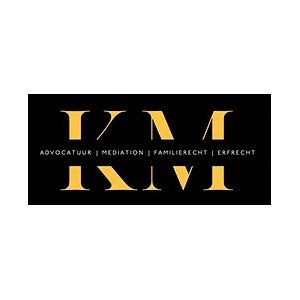Best Will & Testament Lawyers in Netherlands
Share your needs with us, get contacted by law firms.
Free. Takes 2 min.
Or refine your search by selecting a city:
List of the best lawyers in Netherlands
About Will & Testament Law in Netherlands
The Dutch law governing wills and testaments is designed to ensure that a person's final wishes for the distribution of their estate are respected and executed accordingly. In the Netherlands, a will must be made in writing and notarized by a civil law notary, ensuring its legal validity and protecting it from disputes. Dutch law allows for flexibility in testamentary arrangements, as long as they comply with legal standards and respect mandatory inheritance portions, particularly the reserved portion (legitieme portie) for direct descendants.
Why You May Need a Lawyer
While creating a will in the Netherlands is straightforward, various situations might necessitate legal assistance. These include complex family situations, such as blended families or international assets, estate taxation concerns, or specific wishes that require precise legal language to ensure enforcement. A lawyer can also help navigate issues related to the legitimate portion, suggest strategies for estate planning, and assist in resolving any disputes that may arise after a person’s death.
Local Laws Overview
The critical aspects of Dutch law relevant to wills and testaments include the requirement that all wills be notarized, the existence of a forced heirship regime protecting the rights of children and spouses, and the rules governing the executor's role in settling an estate. Additionally, Dutch law recognizes the possibility of joint wills and inheritance contracts, though these require considerable legal oversight. International aspects, such as non-residents with assets in the Netherlands, are governed by EU regulations like Brussels IV, which can influence cross-border inheritance matters.
Frequently Asked Questions
What makes a will legally valid in the Netherlands?
A will must be written and notarized by a civil law notary. This formalization ensures its legal validity and facilitates its execution upon the testator’s death.
Can I include foreign property in a Dutch will?
Yes, you can include foreign property, but you should pay attention to the laws of the country where the property is located since they may affect its distribution.
Are there any mandatory inheritance shares I need to consider?
Yes, Dutch law has mandatory inheritance shares, such as the legitieme portie, which reserves a portion of the estate for direct descendants, regardless of the will's terms.
What happens if I pass away without a will?
If you die intestate (without a will), Dutch inheritance law will dictate the distribution of your estate to your closest relatives, typically spouse and children, in predefined portions.
Can I disinherit a child or spouse in the Netherlands?
While you can choose to omit family members from your will, Dutch law requires that children always receive their lawful portion unless valid legal reasons for disinheritance are established.
How are debts addressed in a will?
Debts are settled from the estate before distribution of assets. This means heirs may inherit a diminished estate value or even assume liability in some cases.
How can I change or revoke my will?
You can change or revoke your will at any time by creating a new one and having it notarized. It's advised to explicitly state that previous wills are revoked.
Who oversees the execution of my will?
You can appoint an executor in your will to manage your estate and ensure that your wishes are carried out. This person can be a lawyer, a trusted individual, or a financial expert.
What taxes are applicable on inheritance in the Netherlands?
Inheritance tax (erfbelasting) is levied on the estate. The amount varies based on the heir's relationship to the deceased and the estate's value.
Are digital assets included in Dutch wills?
Yes, digital assets can be included, but their inclusion should be explicitly mentioned in your will along with instructions for their management or distribution.
Additional Resources
Consider reaching out to the Koninklijke Notariële Beroepsorganisatie (Royal Dutch Association of Civil-law Notaries) for guidance, or explore resources provided by the Nederlandse Orde van Advocaten. The Dutch government’s official sites offer publications and resources on inheritance law to further assist you.
Next Steps
If you foresee the need for legal assistance in drafting or revising your will, consider contacting a civil law notary or a lawyer specializing in estate planning. Preparing a list of your assets and considering your beneficiaries will facilitate productive consultations. It’s essential to address potential complexities early on, particularly if your estate involves international assets or blended family situations. An experienced legal professional can offer tailored advice and ensure that all legal requirements and personal wishes are comprehensively addressed in your will.
Lawzana helps you find the best lawyers and law firms in Netherlands through a curated and pre-screened list of qualified legal professionals. Our platform offers rankings and detailed profiles of attorneys and law firms, allowing you to compare based on practice areas, including Will & Testament, experience, and client feedback.
Each profile includes a description of the firm's areas of practice, client reviews, team members and partners, year of establishment, spoken languages, office locations, contact information, social media presence, and any published articles or resources. Most firms on our platform speak English and are experienced in both local and international legal matters.
Get a quote from top-rated law firms in Netherlands — quickly, securely, and without unnecessary hassle.
Disclaimer:
The information provided on this page is for general informational purposes only and does not constitute legal advice. While we strive to ensure the accuracy and relevance of the content, legal information may change over time, and interpretations of the law can vary. You should always consult with a qualified legal professional for advice specific to your situation.
We disclaim all liability for actions taken or not taken based on the content of this page. If you believe any information is incorrect or outdated, please contact us, and we will review and update it where appropriate.
Browse will & testament law firms by city in Netherlands
Refine your search by selecting a city.
















